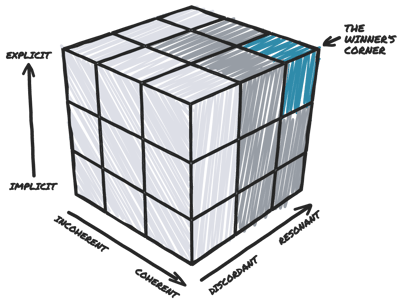What We Mean When We Say We’re “Doing Our Best”
What does it mean to do our best? When we say, “I did my best,” we reveal our contextual understanding, decision-making processes, and ability to turn expectations into agreements.
Whenever we ask someone to do their best, there’s context around the request we need to clarify — and we need to make it explicit, coherent, and resonant. Our “best” depends on our work — are we in a competition, completing a project, having a hard conversation, or something else? By making this context explicit rather than implicit, coherent rather than incoherent, and resonant rather than discordant, we reach the Winner’s Corner — a place where everyone understands what we’re doing and why.

If we have low standards, make poor choices, or have weak contextual frameworks, our best is not likely to be what’s expected. Whenever there’s a disconnect between what we delivered compared to what was needed, there’s an issue of expectations versus agreements. Team leaders need to ensure they’re turning all expectations into agreements to avoid these suboptimal outcomes and misunderstandings.
A leader needs to clarify the required outcome, ensure the team member understands the goal, provide all necessary context, and supply the needed resources (time, training, direction, and so on) to get the work done on time, on budget, and at the quality and quantity needed.
Doing our best is about the choices we make rather than the results we get. It’s about clarifying the required inputs so the outputs meet the goal.
The next time one of your team members says they did their best, but you’re not sure how that can be, reflect on whether you turned expectations into explicit agreements. If you did, and the deliverable is not up to your standards, then a conversation needs to take place. Did they think through the inputs and the outputs? Are they missing context? Were we unclear, or were they the wrong person for the task?
Again, doing our best isn’t about the result. We know when we live up to our agreements (even with ourselves) and when we don’t. Doing our best is about the choices we make, the frameworks we acquire to assist us with making them, and the level of discipline we embrace to honor them.
Over the long term, the average person who consistently lives up to their agreements (where expectations are consistently met or exceeded) beats out a genius who lacks decision-making skills, discipline, and a desire to be on the same page.
What may look like great talent is often a person who is really good at turning expectations into agreements. The best way to turn expectations into agreements is to be super clear on what our goal is and what it’s going to take to get from here to there — and then make sure we have everything we need (direction, time, resources, context, and so on) to get the work done well.
Subscribe to my Founder's Framework newsletter to discover how successful founders leverage proven frameworks to build thriving companies they’ll love forever.





